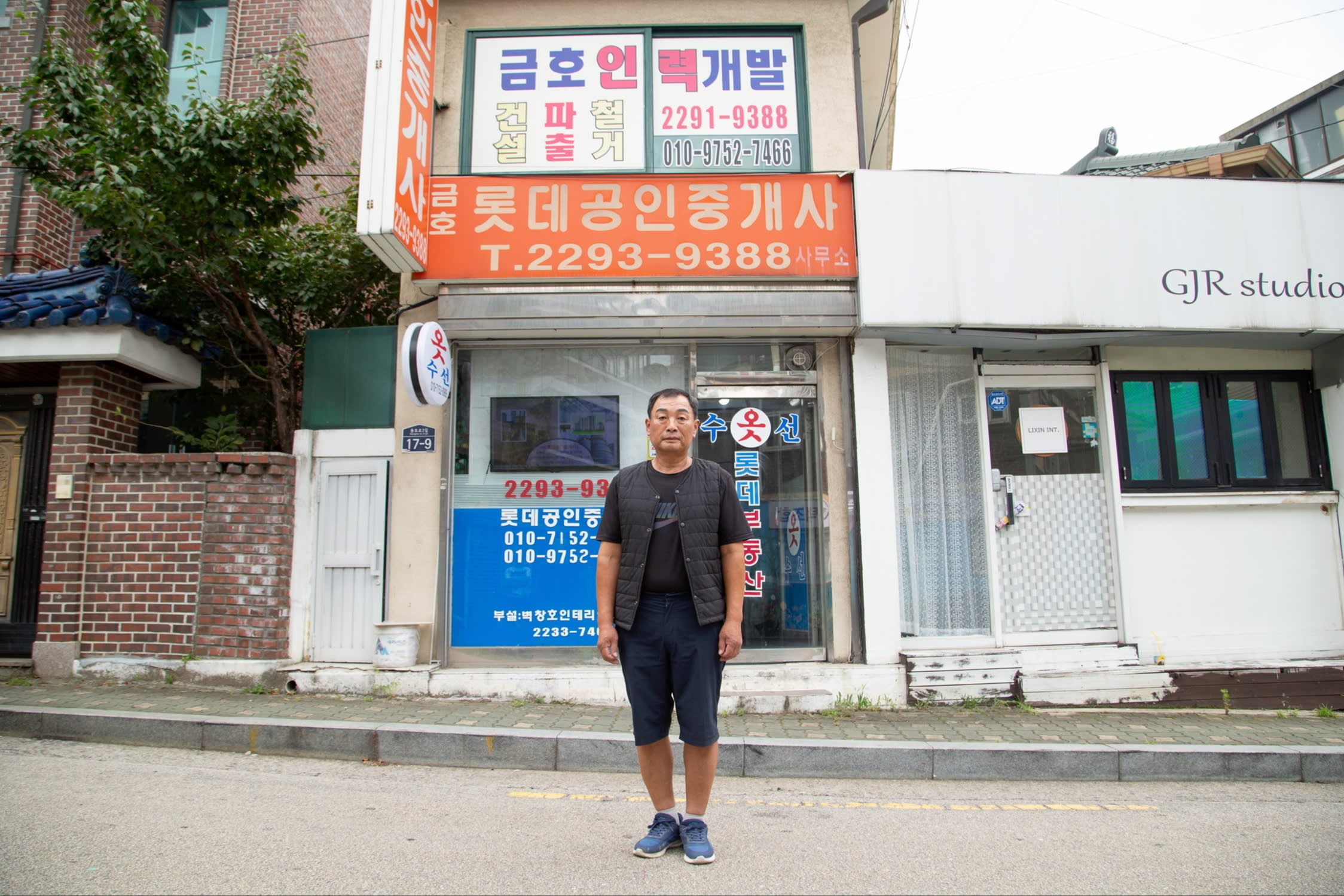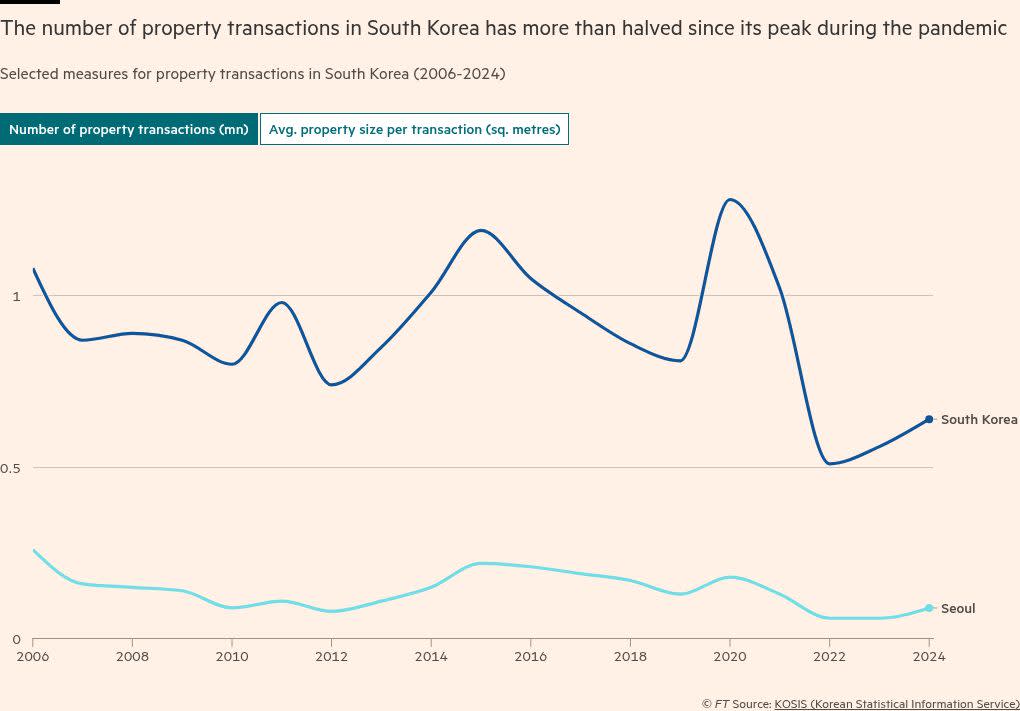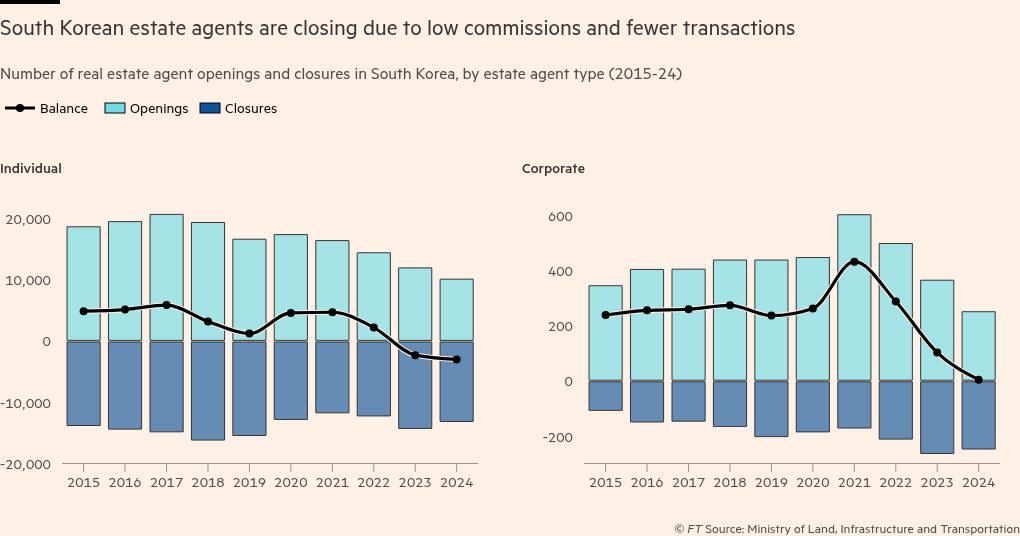Seoul’s property market may be booming, but just north of the Han River across from the glitzy high-rises of Gangnam, 60-year-old estate agent Shin Choong-ho’s business is struggling.
From his small office near a traditional Korean market in the capital, he says business has slowed so much that he is finding it hard to pay the rent. He has taken on a second job as a handyman and is sharing his office with a clothes repair shop to reduce costs.
Shin and his fellow estate agents in South Korea earn some of the lowest commissions among major economies owing to a government cap on fees, and intense competition between realtors.
A surplus of agents is partly because of retirees and married middle-aged women entering the profession and staying in it for longer, attracted by its flexible hours and minimal entry requirements — including no need for a college degree.
‘’In the past, it was a nice job as there were a lot of opportunities to make money due to the city’s redevelopment boom. There were booming times when I signed 10 contracts a day,’’ Shin said. ‘‘As the property market transactions dwindled, it has become difficult to pay my office rent.’’

Commissions on sales and purchases of residential property in South Korea have been capped for decades — now at 0.7 per cent — and agents often get a lower percentage than that because of high competition. That is significantly lower than the US standard commission of 5 to 6 per cent and 1 to 2 per cent charged by brokers in the UK, Israel and Singapore, according to the Global Property Guide.
Total property transactions in South Korea have more than halved since a peak during the Covid-19 pandemic, according to the real estate agents’ association. More than 13,300 realtors went under last year, outpacing about 10,300 estate agencies that newly opened, according to government data.
Even so, with the average price of an apartment in Seoul reaching a record Won1.35bn ($975,000), an agent can receive sizeable commissions from seller and buyer. They can make more in the wealthy districts of Gangnam, where average apartment prices reach Won2.6bn.
Tighter lending rules to rein in the runaway property market in Seoul are adding to the pressures. Shin said business had suffered since his neighbourhood had been designated a redevelopment area vulnerable to speculation, subjecting transactions to public approval.
Apartment prices in Seoul surged to their highest rate in nearly seven years in June, led by the upscale southern districts in Gangnam, where apartment prices are at an all-time high.
Also clouding the future of many of the country’s 110,000 estate agents are new regulations and the rise of artificial intelligence-driven online platforms. Some fear job losses after the government threw cold water on the market recovery in June with a Won600mn mortgage cap to prevent the market from overheating.
HS Chung, 63, who had been running her agency since 1995, said it was possible to stay afloat with one or two deals a month. Her business had been losing money for three years but she is seeing some signs of a pick-up in transactions lately.
She and Shin said they usually get commissions of 0.4 to 0.5 per cent of the transaction value and still see some advantages to the job.
“It is easy to open an agency as it doesn’t cost much. And the working hours are flexible,” she said in an interview in her office in the eastern district of Sungdong-gu. “It has been a satisfying job for married women like me raising children although you can’t make a lot of money.”
Severe competition to get deals drives down commissions. “The exam to get the realtor licence is almost as popular as a driving test,” said Cho Chung-hee, a researcher at Korea Research Institute for Human Settlements.
About half a million Koreans already have licences to open estate agencies, with 15,000 new people obtaining a licence every year. The country has twice as many realtors as the US relative to its population, according to the Korea Association of Realtors.
“Many old retirees as well as young people are interested in entering the market, but it is a tough job to survive if you are not specialised and competitive enough,” said Chae Hyun-gil, a research director at the real estate association. “Many of the small realtors are now in serious trouble, following the government’s latest lending curbs.”
But South Korea has a lease system called jeonse in which a tenant pays a lump-sum deposit for a two-year rental and gets the full amount back at the end of the contract. Landlords can make investments with the deposit before giving it back and keep the returns.
“The unique system increases turnover so the brokerages can stay afloat despite low commissions,” said Cho.
Kwon Dae-jung, professor of real estate at Sogang University in Seoul, noted that South Korean agents’ fees are not so cheap relative to their lack of service. While agents in the west often provide advice on mortgages, appraisals and home inspections, Korean realtors are only legally obliged to conduct due diligence to check defects, show a property to a buyer and write contracts.
“There are too many realtors in the country, with most of them being small-size corner shops run by either one person or with an assistant,” said Kwon. “It’s hard to expect quality service or in-depth consulting from them as you would expect from large-size US realtors.”
Despite the comparatively low rates, many South Koreans are bypassing agents. Direct property transactions made up more than a tenth of all deals in the first quarter of this year, according to online estate portal Ziptoss. On free online platform Carrot Market, agent-free deals increased 220-fold in the past three years to nearly 60,000.
“While there are detailed regulations on brokers, the regulatory framework for online platforms remains weak,’’ said Cho. “Brokers are losing their market share to these platforms.”
Shin said he was slowly losing ground as more young agents came to the market, but that he planned to keep going.
‘‘It is good that I can still do the job even when I become older, but my income keeps falling,’’ he said. ‘‘Although the business is getting more difficult, I still plan to continue the job.”
Data visualisation by William Crofton




